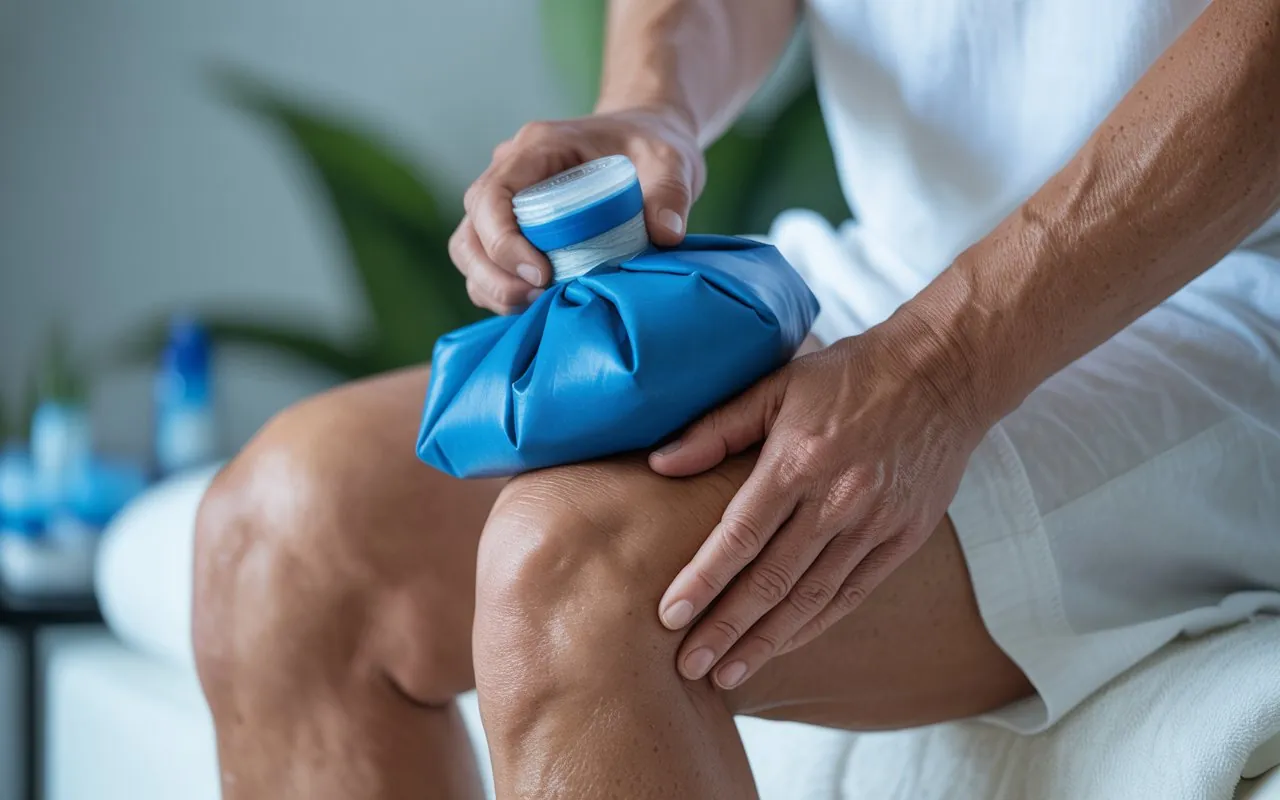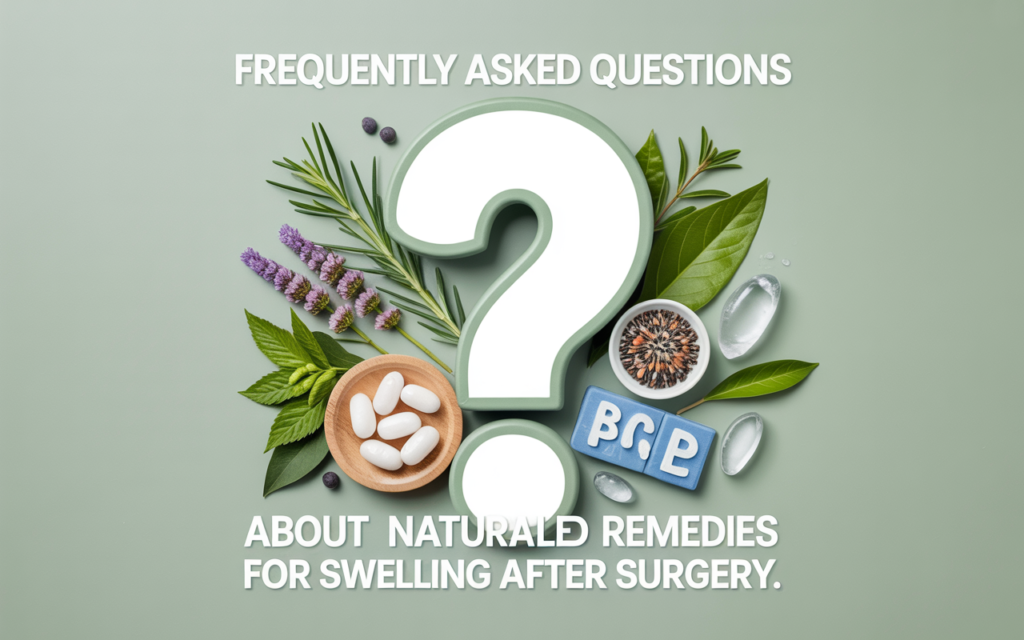Swelling after surgery can feel overwhelming, uncomfortable, and sometimes even alarming, no matter where you are in the world. From Lagos to London, millions seek gentle, natural remedies for swelling after surgery as an alternative or complement to medications. Whether recovering from a simple procedure like wisdom tooth extraction or a complex operation such as joint replacement, swelling—or postoperative edema—remains a universal part of healing. Yet, it doesn’t have to compromise your comfort or extend your recovery time.
Understanding and managing swelling naturally empowers you to take charge of your healing process. Natural strategies not only support physical recovery but also enhance mental wellbeing, promote overall resilience, and minimize unnecessary dependence on pharmaceuticals. This guide uncovers practical, evidence-backed techniques that tap into your body’s innate healing abilities, blending traditional wisdom with the advantages of modern science.
You will discover how the right foods, mindful movement, herbal supports, and lifestyle habits can make a significant impact. With tips suitable for every region and culture, we address common worries, share step-by-step methods, and provide advice tailored for real people facing surgery. Whether you’re preparing for an operation, caring for a loved one, or seeking to optimize your own recovery, these natural remedies for swelling after surgery offer accessible solutions for safer, faster, and more comfortable healing. Dive in to explore actionable insights and global perspectives designed to help you heal stronger, wherever you call home.
Common reasons swelling occurs after surgery:
- Tissue Injury: Surgical incisions disrupt underlying tissues and blood vessels.
- Inflammatory Reaction: The immune system sends fluid, proteins, and white blood cells to the site to promote healing.
- Reduced Movement: Postoperative instructions often limit mobility, which slows circulation.
- Fluid Retention: Certain medications, anesthesia, and IV fluids can cause the body to retain extra fluid.
- Surgical Site and Type: Operations on extremities (arms, legs) or areas far from the heart are more prone to swelling due to gravity and distance from central circulation.
While mild-to-moderate swelling is a normal part of recovery and often expected, excessive or persistent swelling can hinder healing, prolong discomfort, or even become dangerous if not managed properly.
Why Opt for Natural Remedies for Swelling After Surgery?

Conventional medicine frequently uses anti-inflammatory medications (NSAIDs) or corticosteroids to control post-surgical swelling. While these have their place, many people worldwide prefer to supplement their recovery with natural, drug-free approaches—or may be advised to avoid certain medications due to allergies or potential side effects.
Benefits of using natural remedies for swelling after surgery include:
- Minimal side effects when used correctly
- Support for holistic healing—including physical, nutritional, and emotional wellbeing
- Potential to accelerate healing by supporting the body’s innate processes
- Reduction in reliance on pharmaceuticals, especially important for those with sensitivities or on multiple medications
Natural approaches don’t replace medical advice; instead, they offer supportive, gentle ways to manage swelling and promote comfort as you recover.
Natural Remedies for Swelling After Surgery: A Deep Dive into Proven Techniques

Elevation Techniques: Gravity-Assisted Relief

Elevation is often the first recommendation from surgeons and physiotherapists. It’s simple, requires little equipment, and works for most types of surgery (especially limbs).
Why does elevation work?
Gravity helps move accumulated fluid back toward the body’s core, where it can be reabsorbed and filtered out by the lymphatic and urinary systems.
How to elevate for maximum effect:
- For arm or hand surgeries, rest your arm on stacked pillows so your hand is above heart level while sitting or reclining.
- After leg, foot, or knee surgeries, use multiple pillows under your calf and foot—never directly under the knee—to avoid pressure behind the joint.
- Strive for 20-30 minutes of elevation every 2-3 hours during the first week, decreasing as swelling subsides.
- While sleeping, a pillow propped under the affected limb can provide all-night support.
Advanced Tips:
- Portable foam wedges can provide stable, no-fuss support.
- If you’ve had facial or dental surgery, sleeping with your head elevated (extra pillows or an adjustable bed) may prevent swelling from pooling around your face.
Cold Therapy: Cooling Swelling Naturally

Ice packs and cold compresses remain staples among natural remedies for swelling after surgery worldwide. Cold therapy helps by constricting blood vessels, reducing fluid leakage, and numbing nerve endings to relieve pain.
How to use cold therapy safely:
- Apply a cold pack, bag of frozen peas, or a damp cloth chilled in the fridge—not the freezer.
- Always wrap the ice in a cloth or towel to prevent frostbite or skin irritation.
- Use 15-20 minutes on, then at least 40 minutes off. Repeat as needed, especially in the first 48–72 hours.
- Never apply cold to open wounds and consult your surgeon if you have concerns about circulation (as in diabetes or peripheral artery disease).
For facial or dental surgeries:
- Use a soft, reusable gel ice mask or make a cold pack from a damp washcloth.
- Hold gently against cheeks or jaw for short intervals.
Cold therapy is most useful in the very early days following surgery—beyond that, switch to warm compresses to encourage circulation unless directed otherwise.
Compression: External Pressure for Internal Relief
The judicious use of compression wraps or garments can help prevent excess fluid accumulation, speed up lymphatic drainage, and reduce postoperative swelling. Compression is particularly standard after orthopedic, vein, and plastic surgeries such as tummy tucks or liposuction.
Best practices for compression therapy:
- Surgical stockings, ace bandages, or custom compression garments should fit snugly but never so tight as to impair circulation or cause numbness.
- Apply first thing in the morning, before swelling worsens.
- Remove at night unless instructed otherwise.
- Inspect skin frequently under the bandage for redness, blisters, or signs of poor circulation.
Example: After knee surgery, a well-fitted compression sleeve can dramatically reduce swelling and provide support for early movement.
Important: Only use compression if your surgical team recommends it, as certain conditions (like vascular disease) or surgical sites may be adversely affected by unnecessary pressure.
Gentle Movement: Circulation is Healing
Immobility after surgery dramatically increases the risk of swelling and dangerous blood clots. Once cleared by your surgeon or physiotherapist, slowly incorporating gentle movement helps restore healthy circulation and prevents pooling of fluid.
Types of safe postoperative movement:
- Ankle pumps and circles: Gently flex and point your toes or rotate your ankles every hour while lying down.
- Fist making or finger tapping: For finger and hand surgeries, promote movement with simple, frequent exercises.
- Walking: Short, slow walks—even around your home—stimulate blood and lymph flow.
Progression:
- Start with gentle, non-weight-bearing exercises and build up as pain allows.
- Never push past discomfort, especially in the early days.
- Use assistive devices (crutches/walkers) if recommended, to avoid falls and further injury.
Case Example:
After abdominal surgery, rolling from side to side in bed and deep breathing exercises can prevent swelling and chest congestion at the same time.
Nutrition and Diet: Healing from the Inside Out

Your body requires extra nutrients and hydration during recovery. What you eat—and avoid—plays a direct role in reducing swelling and speeding healing.
Anti-Inflammatory Foods: Making Every Bite Count
Load your plate with foods that fight inflammation and help tissue repair:
Top anti-inflammatory foods:
- Leafy greens (spinach, kale, dandelion greens): Rich in vitamins K and C, help control inflammation.
- Fresh berries (blueberries, raspberries, acai): Packed with antioxidants to defend against cellular stress.
- Pineapple and papaya: Contain enzymes (bromelain, papain) with potent anti-inflammatory action.
- Nuts and seeds (walnuts, flaxseed, chia): Source of omega-3s to regulate immune response.
- Fatty fish (salmon, mackerel, sardines, herring): Omega-3 fatty acids help moderate swelling after injury or surgery.
Global Alternatives:
If some foods are not available in your area, try:
- Moringa leaves (widely used in Africa and Asia) as a powerful anti-inflammatory.
- Local root vegetables (sweet potatoes, yams) for fiber and vitamins.
Avoid while healing:
- Salt-heavy processed foods (they cause fluid retention)
- Refined sugars (can increase inflammation)
- Alcohol (slows tissue healing and increases swelling risk)
Staying Hydrated: The Unsung Remedy
Proper hydration reduces swelling by flushing excess sodium and toxins, maintaining healthy cell function, and preventing constipation (a common post-surgery issue).
How much to drink:
- Adults: Aim for 8-10 glasses (about 2–2.5 liters) of water daily.
- Include herbal teas high in antioxidants—think rooibos, ginger, or chamomile.
- Limit sugary or caffeinated beverages which may dehydrate or spike inflammation.
Hydration tip:
If you find plain water boring, infuse with healing herbs like mint, cucumber, or sliced citrus for added flavor and nutrients.
Herbal, Homeopathic, and Supplement Remedies for Swelling After Surgery
With centuries of traditional use and increasing scientific support, a variety of herbs and supplements can serve as natural ways to control swelling after surgery. Always consult your surgeon or pharmacist before trying anything new, as some may cause adverse effects or interact with your medications.
Herbal Remedies to Consider
Arnica montana:
- Used as a topical gel or oral tablet for centuries to ease bruising, muscle soreness, and swelling.
- Shown in research to reduce swelling and healing time, especially after soft tissue surgeries.
Bromelain:
- Natural enzyme from pineapple cores, available as supplements.
- May help break down fibrin, a protein involved in inflammatory swelling.
- Caution: Can thin the blood—do not use before surgery or with anticoagulants.
Turmeric (Curcumin):
- Indian spice with potent anti-inflammatory and antioxidant effects.
- Can be added to food or taken as a supplement (check for piperine in black pepper to increase absorption).
Ginger:
- Fresh or dried, ginger is globally used for swelling, pain, and nausea after surgery.
- Brew as a tea or add liberally to food.
Gotu kola:
- Used in African and Asian traditions; research suggests it supports wound healing and may reduce swelling.
Homeopathic Remedies
- Arnica (in homeopathic dilutions), Bellis perennis (for deeper tissue injuries), and Calendula may be used in consultation with a holistic health provider.
Vitamins and Nutritional Supplements
- Vitamin C and zinc: Critical for collagen production and immune support; can be supplemented during recovery.
- Quercetin: A plant flavonoid found in onions, apples, and berries. Available as a supplement and may have anti-swelling properties.
General rules:
- Never start herbal or vitamin supplements without doctor approval, especially if you are taking blood thinners or have allergies.
Physical Therapies and Holistic Approaches
While elevation, cold, and movement are the backbone of natural swelling control, many people benefit from professional and self-care physical therapies.
Lymphatic Drainage Massage
A gentle massage technique that aids the natural movement of lymph fluid, often used after plastic surgery or cancer operations.
- Should only be performed by a licensed massage therapist or physiotherapist familiar with your surgery.
- Can reduce edema, bruising, and discomfort but is contraindicated in the presence of infection, blood clots, or certain heart conditions.
Acupuncture
This ancient Chinese medicine technique involves using very fine needles to stimulate healing points in the body.
- Some studies suggest acupuncture can reduce postoperative swelling and pain.
- Seek a licensed, experienced practitioner who is aware of your surgical history.
Traditional Remedies from Around the World
- African shea butter: Used topically to soothe skin and swelling (external use only).
- Ayurvedic poultices: India’s Ayurveda medicine uses herbal poultices (with turmeric, neem, or tulsi leaves) for local swelling.
- Arnica-infused olive oil: Used in South America and Europe for massage of bruised areas.
Mind-Body Strategies: Managing Swelling with Your Mind and Breath
Stress Reduction and Rest
- High stress slows healing and increases inflammation.
- Engage in meditation, mindfulness, or prayer—practices shown to decrease cortisol and improve immune response.
Deep Breathing and Guided Relaxation
- Diaphragmatic breathing (deep belly breathing) boosts lymphatic movement and oxygen flow to tissues, aiding in swelling reduction.
- Try guided meditation apps or recordings focused on healing and relaxation.
Sleep: The Ultimate Healer
- Ensure adequate, restful sleep—your body’s main time for tissue repair.
- Sleep with the affected area elevated if possible.
- Keep your environment cool, dark, and quiet for optimal rest.
Practical Home Care Tips for Swelling Reduction
- Wear comfortable, loose-fitting clothing to prevent further restriction of swollen tissues.
- Monitor your incision daily for signs of infection (redness, heat, oozing, or increasing pain).
- Set timers for movement and ice therapy—regularity brings results.
- Ask friends and family for help with meals, chores, or errands so you can focus on recovery.
When Natural Remedies Aren’t Enough: Recognizing Red Flags

While many cases of postoperative swelling resolve naturally, some symptoms demand urgent medical attention. If you experience any of the following, seek care immediately:
- Swelling that’s sudden, severe, or associated with severe pain or difficulty breathing
- Red, hot, or rapidly expanding areas (may indicate infection or DVT)
- Swelling that does not improve or worsens after 2–3 days
- Signs of an allergic reaction (hives, swelling of face/tongue, difficulty swallowing)
- Wound opening, pus, or foul odor
Remember: Natural remedies for swelling after surgery complement, but never replace, professional medical care.
Cultural and Regional Considerations: Natural Healing Worldwide
Wherever you live, basic principles of caring for swelling after surgery apply. For best results:
- Adapt local resources (herbs, foods, supportive care) as appropriate
- Communicate with your healthcare provider about your interest in natural remedies; many will work with you to develop a safe, integrative plan
- Understand your unique risks (e.g., tropical climates may increase risk of wound infection; high altitudes can affect swelling)
Summary Checklist: Natural Remedies for Swelling After Surgery
- Elevation above the heart—20–30 minutes, 3–5x daily
- Apply cold (not ice) for 15–20 minutes several times per day
- Wear compression if prescribed
- Move gently and regularly
- Focus on anti-inflammatory foods, hydrate
- Try gentle herbal support with doctor’s okay
- Use mind-body and rest techniques
- Watch for warning signs and consult your healthcare provider as needed
Frequently Asked Questions

How soon can I use natural remedies for swelling after surgery?
Most natural strategies such as elevation, ice, hydration, and diet changes can start within hours after surgery (once you’re awake and alert). Herbal remedies and supplements should wait until you have clearance from your doctor.
Are there natural ways to address swelling in sensitive or hard-to-reach areas?
Yes! For head, neck, or face surgeries, focus on upright posture, cold compresses, gentle jaw/tongue movement, and soft anti-inflammatory foods. Always protect the incision and follow your surgeon’s care plan.
Can I use multiple natural remedies at once?
Absolutely! Combining elevation, cold, hydration, diet, movement, and rest results in a synergistic healing effect. Add supplements with medical guidance.
How long does post-surgical swelling last, and when should I worry?
- Minor procedures: Swelling peaks in 2–3 days, subsiding over 1–2 weeks.
- Major procedures: Swelling can last 2–4 weeks (or longer if you have certain medical conditions).
- Alert your physician if swelling doesn’t improve or returns after getting better.
conclusion
Natural remedies for swelling after surgery blend the wisdom of tradition with modern science, offering accessible, effective, and gentle paths to faster and more comfortable healing. By centering your recovery on comprehensive self-care—movement, nutrition, herbal support, and mindful rest—you invest in the body’s amazing ability to rebound.
Every recovery journey is unique: listen to your body, respect your surgeon’s advice, and never hesitate to reach out for support when needed.